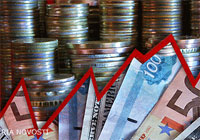Putin is risking the engine of Russia’s economy

(Business New Europe – bne.eu – COMMENT: Lord Peter Mandelson of Global Counsel – May 27, 2014)
Peter Mandelson was European Trade Commissioner between 2004 and 2008. He is now Chairman of Global Counsel
Despite Russia’s recent underperformance, the size and potential of its economy has made it an attractive prospect for global companies. From German manufacturers to French and Italian luxury brands and British retailers, businesses have been drawn there to trade and invest. For them Russia has been too big to miss.
But today a different view is taking hold: that unless President Vladimir Putin’s attention shifts urgently from political entanglement in his neighbourhood to prioritising his nation’s economic needs, Russia’s disappointing economic performance will become an established trend.
Future investment will depend on perceptions of political risk as well as expected economic returns – and Mr Putin’s apparent readiness to see Russia isolated in an interdependent world has increased this risk.
No one realises this more than Russian businesses – ultimately the vehicles that will diversify and strengthen the economy – which are thinking hard about where their president’s actions are taking them.
The question uppermost in minds is whether Mr Putin, so far the master of tactics in Ukraine, has the sense to realise when enough is enough.
Destabilisation
In Romania and Poland this month, I met plenty of seasoned Russia watchers. There is a widespread belief that Russia will not occupy Ukrainian territory beyond Crimea – given the physical resistance and costs involved – but wants to create a weak, non-aligned buffer against Europe that falls within its sphere of influence. There is further suspicion that Russia wants to stop Moldova, a former Soviet republic, signing an Association Agreement with the EU.
Should Moscow pursue these aims, using destabilisation and pressure on the local population and politicians, there will be limits to what Europe or the US can do. The west will neither launch a full military intervention nor, given Europe’s energy dependence on Russia, introduce an Iran-style blockade.
But this does not mean the West will simply stand aside. Nato’s collective security guarantees will be reaffirmed. The illegal annexation of Crimea will never be recognised; the state of limbo will become a growing financial burden for Russia. The authorities in Kyiv will be buttressed by Europe, receiving economic assistance and help to reform the energy market. Separately there will be pushback against the dominant market position in Europe of Gazprom, Russia’s state-controlled gas company.
Russian businesses have every reason to fear the consequences of such a response, which will be more united than the country’s politicians assume. The effect, while not immediate, will be a discernible impact on the ability to attract capital, service debts and access the international financial system.
But taking such action should not mean cutting ourselves off from any contact with Russia. On the contrary, every effort should be made to engage in hard-headed dialogue that brings home to anyone with an independent mind, an economic interest and a voice in the country that there is an alternative to confrontation; that in Europe we would prefer to share our continent with Russia, sustaining rules that have delivered the longest period of peace to date and building stronger economic and trading ties.
End of EEU as we know it
In more positive times, as EU trade commissioner, I worked with my Russian counterpart to forge a vision and blueprint for a comprehensive trade and investment agreement between the EU and Russia. Both sides embraced this path but it was predicated on Russia’s entry to the World Trade Organisation. This was a painstaking process during which Mr Putin developed an alternative vision – a customs union formed from former Soviet republics, including Ukraine, which would achieve parity with the EU rather than a close partnership.
This Eurasian Economic Union will not now be created as Mr Putin conceived it – the regional fallout from Crimea’s annexation has seen to that. The question is whether, as this reality becomes evident, Mr Putin can be drawn back into embracing the sort of collaborative economic relations with Europe envisaged in our original blueprint.
Much depends on what happens in coming weeks and months. Europe must be ready to respond vigorously to further destabilisation in Ukraine and elsewhere if this is what Mr Putin chooses, if only for the sake of our own self-respect. But equally, we should not close our minds to a different sort of relationship with Russia should the possibility emerge. This may seem a distant possibility but it is not beyond imagination, especially when the mounting economic cost of Russia’s actions, and the economic sacrifice of its people, force Mr Putin to reflect on the precarious path he is following.
